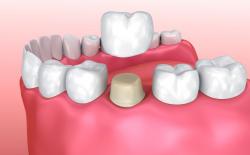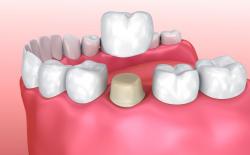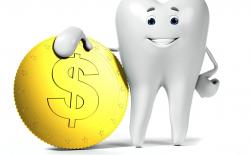The main categories of dental crown pains
First of all, you should know that some pain 1-2 days after the procedure is normal and doesn't necessarily indicate a problem with your crown.
Some sensitivity 2-3 days after the procedure is still acceptable.
However if you still feel the pain 2-3 days after the procedure or the pain is so severe that you're sure something is not right, you should contact your dentist as soon as possible.
If there is a problem with your crown, this is something that will not go away with time, actually it is going to get worse, the sooner you let your dentist know, the better.
There are three main categories of dental crown pain, depending on when the problem occurs first:
- Within 1-2 days of the procedure: as mentioned above, some pain can be perfectly normal at this stage. The most common reasons are:
- Sensitivity of freshly cut dentin
- Irritation because of the adhesive cement
- Pain that still persists a few days after the procedure: this usually indicates a problem with either the crown or the dental work, you need to see your dentist- The most common reasons are:
- High points
- Extremely sensitive dentin
- Delayed crown pain, months/years after the procedure: this usually means either a fractured crown or an oral hygiene problem, you need to see your dentist.. The most common reasons are:
- Secondary caries
- Peri-apical infection
- Fracture of dental crown
- Wearing out of dental crown
Loose crowns, trauma to the tooth can also cause dental crown pain.
What causes tooth crown pain? Duration: 0:59
Causes of dental crown pain immediately after the procedure
As mentioned above, some pain 1-2 days after the procedure can be normal.
Sensitivity of freshly cut dentin
The outermost tooth covering consists of enamel which is free of any kind of sensation, but the dentin which is beneath the enamel is a very sensitive tissue. Dentin has extremely fine tubules filled with water, this can be seen at a microscopic level.
Whenever a pressure is created on the dentinal surface the water inside the tubules moves rapidly creating pressure in the nerve endings which are present in the pulp. Pulp lies immediately beneath the surface of the dentin with numerous nerve endings at the periphery (that is at the junction of pulp and dentin). This makes it even more sensitive.
This type of pain can be taken care of by avoiding extreme temperatures, consuming very hot old very cold drinks or food.
Irritation because of the adhesive cement
The dental crown is glued to the prepared tooth with the help of the adhesive cement. The cements used are acidic in nature, which irritates the dentin resulting in pain.
Another reason for this kind of crown pain or discomfort is that few molecules may leach out from the cement layer into the dentinal tubules.
This subsides within few hours as the pH of the cement starts rising in few hours and becomes nearly neutral or alkaline (few types of cements).
Dental crown pain after a few days
If you are still experiencing pain a few days after the procedure, it's best to consult with yourr dentist, as the pain in such cases is unlikely to go away and should be checked.
These are the two most common problems in such situations:
- High points: This is the most common reason of dental crown pain after 3-4 days of crown placement. High points result into traumatic bite which creates more pressure on the tooth on which the crown is placed leading to pain and discomfort while chewing and biting.
- Extremely sensitive dentin: Very little remaining dentin thickness which makes the nerve endings more susceptible to stimulation resulting in pain.
5 Ways to Tell if Your Crown Fits Correctly. Duration: 1:11
Delayed dental crown pain - after a few months
The most common reasons for pain months or years after the procedure is either a chipped/broken crown or a dental health problem.
Secondary caries
It is the most commonly encountered reason behind pain after months or years after crown placement.
The secondary or recurrent caries occur near the neck of the crown - that is at the margin of the dental crown - as this area is more susceptible to plaque formation and retention. Plaque favors bacterial growth resulting in caries.
Secondary caries require excavation followed by filling the cavity and placement of a new crown. Deeper caries may require root canal treatment as well.
Periapical infection
Infection occurring at the root apex may be the reason of dental crown pain.
Here are a few reasons responsible for periapical infection:
- incomplete removal of pulp tissue during root canal treatment
- left out infected pulp tissue in pulpotomy treatment
- infection due to progression of secondary caries
Fracture of dental crown
Excessive occlusal load (biting pressure) may fracture or chip the crown. This can happen anytime between few weeks to few months or years depending upon the material and its
properties used for the preparation of dental crown.
Wearing out of dental crown
Over a period of time and even due to eating habits and patterns the occlusal surface (upper surface) wears off. This may expose the natural cusps of the tooth.
In such cases the crown needs to be replaced with a new crown.
Symptoms of dental crown problems
The most common and obvious symptom of a problem with your crown is, of course, pain or sensitivity. However there are some other symptons that could indicate a potential complication with the dental crown:
- Pain and discomfort: It is usually associated with chewing as it creates the pressure on the tooth.
- Sensitivity of tooth: This is seen in vital tooth with recurrent caries and also in loose crowns .
- Sensitivity due to galvanism: Galvanism is seen when two dissimilar metals are used for fabrication of crown, especially when they are placed adjacent to each other or opposite to each other. Galvanic current is developed as metals provide free ions and the saliva acts as a medium. This also results in pain even at rest. It is always better to avoid two different metals or use metal-free crowns.
- Sensitivity and pain in gingival (gums): The gums surrounding the tooth crown may show redness and inflammation due to the improper fit of the crown placed. The sharp edges of the dental crown irritates the delicate gummy tissue resulting in bleeding, sensitivity and pain. Also poor oral health contributes to dental crown complications in the long run.
- Bleeding pockets and pus discharge: The dental crown if placed very deeply may irritate the gums especially the pocket area causing the tissue to bleed . Pus discharge may be seen due to inflammation. To avoid any periodontal tissue damage, it is mandatory to keep the crown surface and margins clean by practicing proper brushing techniques and professional cleaning from time to time.
- Pain in temporomandibular joint (TMJ): Traumatic bite because of high points may disturb the occlusion over time. This may affect the joint between the jaw and the skull . It causes pain in the region in front of the ears.
- Abrasion and attrition of crown: Poor material choice with lower abrasion resistance causes the material of the crown to abrade even due to normal activities like brushing. Also attrition is seen with the dental crown or opposite natural tooth whichever has poor resistance. This leads to flattened appearance of the crown accompanied by difficulty of chewing . Proper crown type selection considering the eating habits and other factors can help to avoid early attrition and aging of the dental crown.
Tooth pain after fitting a temporary dental crown
Temporary crowns are placed immediately after the tooth preparation to maintain the arch integrity until the permanent crown is manufactured and placed.
The basic reason why a temporary crown placed is that it protects the prepared tooth from sensitivity and also preserves the tooth structure in cases where the permanent
crown placement is to be delayed due to various reasons like questionable prognosis / result / outcome) of the treatment.
Causes of tooth pain after temporary crown placement:
- Poor fit of the crown
- Poor anatomy of the crown causing different forces to act on the tooth
- Improper occlusion: Issues related to occlusion are commonly seen with temporary crowns as they are fabricated grossly or prefabricated crowns are placed which are aimed to prevent the crown structurally till the permanent crown is placed.
- Treatment failure: Treatment failure with questionable prognosis treatment plan (as discussed earlier) may evoke pain and discomfort.
Temporary crowns are lot less durable than permanent crowns, you should take care of them properly, e.g. do not eat very hard food.
In case of having temporary crowns, some discomfort is acceptable but you usually shouln't feel pain. If you think there is a problem with your temporary crowns, it's best to consult with your dentist.
When to call your dentist?
Pain and little sensitivity is usually seen immediately after the crown placement. But this usually subsides within a few days.
If the discomfort and pain continues, you may need to consult your dentist to check for the underlying cause.
Sudden pain and discomfort after months or years may need early attention as this may be due to recurrent caries and infection beneath the crown. This requires removal of the crown, treatment of the caries and placement of a new crown.
TMJ pain also needs attention not only because of the dental crown pain but there can be a number of other reasons causing pain in the TMJ.
Sharp pain after having a dental crown done. Duration: 1:00
Frequently asked questions
How to get relief from a tooth crown pain (home remedies)?
Permanent relief can be obtained only by the proper consultation and the treatment of the cause of crown pain by your dentist.
Temporarily the pain can be relieved by keeping a cotton ball damped in clove oil. But this only gives temporary results and acts by sedating the nerve endings. The effects lasts only for few hours.
It is important to keep in mind that even if pain is relieved, damage is still under progress. So we strongly recommend you to visit your dentist as early as possible to avoid any progress of the underlying cause or any other complications along with the proper treatment.
How long does it take for a crown to stop hurting after the treatment?
Normally initial discomfort for 1 or 2 days may be felt. Once you get adapted to your new crown, it should feel normal.
Even the sensitivity subsides in 2 to 3 days normally. It does not hurt after that in normal conditions.
Is it normal for a tooth to hurt after dental crown procedure?
Slight discomfort with sensitivity is seen which goes off in 2 to 3 days normally.
How long do dental crowns last?
On average the lifespan of a dental crown can be anywhere between 5 and 15 years. However many crowns last two decades or longer.
For more detailed information, please check out our artilce about the longevity of dental crowns.
You might also be interested in:
How Long Do Dental Crowns Last?
While the average lifetime of a crown is 5-15 years, many crowns last a lot longer than that. Learn more about the most important factors that determine the longevity of a dental crown!
Dental Crown Costs
How much do dental crowns cost? The average price is around $1,000 and $1,500, but prices vary widely. Find out what factors affect the price of a dental crown!
Front and Back Teeth Crowns
What type of crowns are ideal for front teeth and back teeth? Read about the most important differences between the different dental crown materials.



